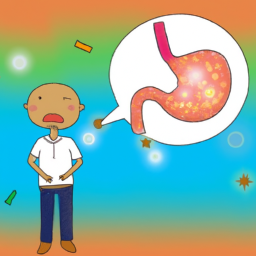About Stomach Ulcer, what to do?

The link between H. pylori and stomach cancer
2023-03-05
Found out Who and How the H Pylori breath test should be done?
2023-03-08About Stomach Ulcer, what to do?

About Stomach Ulcer, what to do?
-
Table of Contents
<Newly launched H Pylori Test Solutionp>”Don’t Let Stomach Ulcers Get You Down – Take Action Now!”
Introduction
Stomach ulcers, also known as peptic ulcers, are painful sores that develop in the lining of the stomach or small intestine. They are caused by an imbalance between digestive fluids in the stomach and the protective mucus that lines the stomach wall. If left untreated, stomach ulcers can lead to serious complications, such as internal bleeding, infection, and even stomach cancer. Fortunately, there are several treatments available to help manage and treat stomach ulcers. These include lifestyle changes, medications, and surgery. Making dietary changes, avoiding certain foods, and reducing stress can help reduce the risk of developing stomach ulcers. Additionally, medications such as proton pump inhibitors and antibiotics can help reduce the symptoms of stomach ulcers and promote healing. In some cases, surgery may be necessary to remove the ulcer or repair any damage it has caused.
What Are the Treatment Options for Stomach Ulcers?
Stomach ulcers, also known as peptic ulcers, are open sores that develop on the lining of the stomach, small intestine, or esophagus. They are caused by an imbalance between digestive fluids in the stomach and duodenum, which can be caused by a variety of factors, including the use of certain medications, smoking, alcohol consumption, and stress. Treatment for stomach ulcers depends on the underlying cause and the severity of the ulcer.
The primary treatment for stomach ulcers is medication. Antibiotics are prescribed to treat ulcers caused by a bacterial infection, such as Helicobacter pylori. Proton pump inhibitors (PPIs) are used to reduce the amount of acid produced in the stomach, which helps to reduce pain and promote healing. H2 blockers, such as ranitidine, are also used to reduce the amount of acid produced in the stomach. In some cases, antacids may be prescribed to neutralize stomach acid.
In addition to medication, lifestyle changes can help to reduce the symptoms of stomach ulcers and promote healing. It is important to avoid foods and beverages that can irritate the stomach, such as spicy foods, alcohol, and caffeine. Smoking should also be avoided, as it can worsen the symptoms of stomach ulcers. Stress management techniques, such as yoga, meditation, and deep breathing, can also help to reduce symptoms.
In some cases, surgery may be necessary to treat stomach ulcers. Surgery may be recommended if the ulcer is bleeding or if it is not responding to medication. Surgery may involve the removal of the ulcer or the repair of the damaged tissue.
Stomach ulcers can be painful and uncomfortable, but with proper treatment, they can be managed and healed. It is important to speak to a doctor if you are experiencing any symptoms of a stomach ulcer, such as abdominal pain, nausea, vomiting, or loss of appetite.
What Causes Stomach Ulcers and How Can They Be Diagnosed?
Stomach ulcers, also known as peptic ulcers, are open sores that develop on the lining of the stomach, small intestine, or esophagus. They are caused by an imbalance between digestive fluids in the stomach and the protective mucus that lines the stomach wall. This imbalance can be caused by a variety of factors, including the bacteria Helicobacter pylori, long-term use of nonsteroidal anti-inflammatory drugs (NSAIDs), and stress.
Diagnosis of stomach ulcers typically begins with a physical examination and a review of the patient’s medical history. The doctor may also order tests such as an endoscopy, which uses a thin, flexible tube with a camera to examine the inside of the stomach, or a blood test to check for the presence of H. pylori. In some cases, a biopsy may be taken to confirm the diagnosis.
Treatment for stomach ulcers depends on the underlying cause. If H. pylori is present, antibiotics may be prescribed to eliminate the bacteria. If NSAIDs are the cause, the doctor may recommend switching to a different type of medication or reducing the dosage. Stress management techniques, such as relaxation exercises and counseling, may also be recommended. In some cases, surgery may be necessary to repair the ulcer.
What is a Stomach Ulcer and What are the Symptoms?
A stomach ulcer, also known as a peptic ulcer, is a sore or lesion that develops in the lining of the stomach or small intestine. It is caused by an imbalance between the digestive juices in the stomach and the protective mucus that lines the stomach wall. This imbalance can be caused by a variety of factors, including the use of certain medications, smoking, alcohol consumption, and stress.
The most common symptom of a stomach ulcer is a burning or gnawing pain in the upper abdomen. This pain may be worse when the stomach is empty, and it may be relieved by eating or taking antacids. Other symptoms may include nausea, vomiting, loss of appetite, weight loss, and bloating. In some cases, a person may experience dark or tarry stools, which can be a sign of bleeding in the stomach.
If you experience any of these symptoms, it is important to seek medical attention. Your doctor can diagnose a stomach ulcer through a physical exam, blood tests, and imaging tests. Treatment typically involves lifestyle changes, such as quitting smoking and reducing stress, as well as medications to reduce stomach acid and promote healing.
Conclusion
Stomach ulcers can be a painful and uncomfortable condition, but with the right treatment and lifestyle changes, they can be managed. It is important to speak to your doctor if you think you may have a stomach ulcer, as they can provide the best advice on how to treat it. Eating a healthy diet, avoiding certain foods and drinks, and taking medications as prescribed can help to reduce the symptoms of a stomach ulcer and prevent it from coming back.
If you think you may have a stomach ulcer, don’t wait to get it checked out. Visit eTestMedical to find a doctor near you and get the help you need. Don’t let a stomach ulcer go untreated – take action now!



